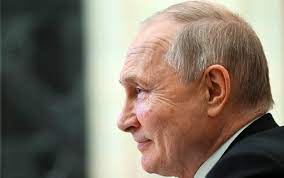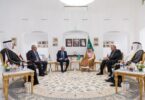Hamish De Bretton-Gordon
It is often said that “the only thing necessary for the triumph of evil is for good men to do nothing”. That maxim is about to be put to the test in the Black Sea. Following Russia’s shock withdrawal this week from the deal brokered in July 2022 by the UN and Turkey guaranteeing safe passage for grain exports, sudden and deliberate Russian missile attacks on Ukraine’s southern coast have destroyed 60,000 tonnes of grain and damaged vital storage infrastructure.
This is a criminal act, threatening starvation in African countries and higher food prices around the world. Yet the West seems to be shrugging its shoulders, implying “there’s nothing we can do” without the danger of escalation. If we accept this, then we risk all the progress Western powers have made in undermining Putin. For months, I have talked about the dangers of Moscow waging “unconventional warfare” – whether going nuclear via blowing up the Zaporizhzhia power plant, or attacking chemical facilities, or, indeed, food supplies. The eventual attention given to the nuclear threat arguably deterred Moscow on the first two risks for now, but on the latter Nato and the UN were complacent, assuming Russia would not withdraw from a deal giving them access to top-table discussions with world leaders. That neglect has now come at a heavy price.
If Putin is waging a vicious campaign to try to bring famine to Africa – one he can still try to blame on Western sanctions – it would mark yet another horrific war crime to add to the growing list. More than 50 million people across Somalia, Kenya, Ethiopia and South Sudan are in need of food aid due to successive years of failed rains. Thousands, perhaps tens of thousands, could now die. Furthermore, it would probably trigger a massive migration crisis into Europe, destabilising the Continent and advancing calls for an end to the war via a negotiated settlement. We must assume this is Putin’s primary aim.
It would also drive a wedge between the alliance supporting Ukraine after the comparative unity of the Nato summit at Vilnius last week. We know some are less committed to a maximalist Ukrainian victory. The prospect of increased food prices as we enter two years of important elections, including in the UK, may lead some to break cover and try to work with Russia rather than isolate it. That the West can allow this should be unconscionable. For one, it would show to Putin that – once again – he can escalate this war without major consequence. How we respond to an incident like this will shape his strategy. Now it may be food, but next time it could be a tactical nuke. There is next to nothing that Putin will not do if he is allowed to do it; he operates in the space that is given to him. We should be thinking outside the box, invoking the spirit of the Berlin air lift in seeking to find extraordinary solutions. We could, for instance, try to protect grain ships through the formerly agreed boundaries of the deal, passing through international waters to Ukraine. The Montreux Agreement allows only warships from countries around the Black Sea to enter those waters, so a Nato flotilla to protect the grain ships would in theory be possible from Turkey, Bulgaria and Romania. Another option is to transport the grain across land via rail and road. Kyiv believes this is possible, and Germany is said to be warm to the idea in theory.
Whatever solutions we come up with, the vital thing to remember is that no level of depravity is off limits to Putin and his gangsters running this war. This is a global issue and not just between Russia and Ukraine. The grain crisis offers the West a chance to reach out to those countries who have, at times, leaned towards Moscow. Turkey has been humiliated and will be sympathetic. African nations are listening, with Kenya’s government describing Russia’s decision to withdraw as a “stab in the back”. The UN brokered this deal and should feel morally obliged to find a solution rather than just sitting on its hands. It is a tragic irony that it was the Royal Navy and Merchant Navy convoys that kept Russia in the fight against Nazi Germany, yet now it is Moscow that weaponises food against the free world. In these circumstances, shrugging and doing nothing cannot suffice.
The Telegraph







